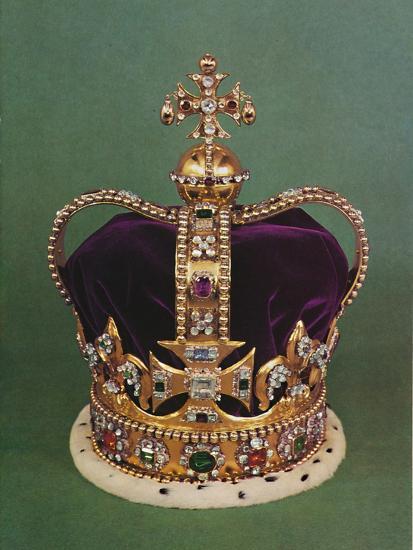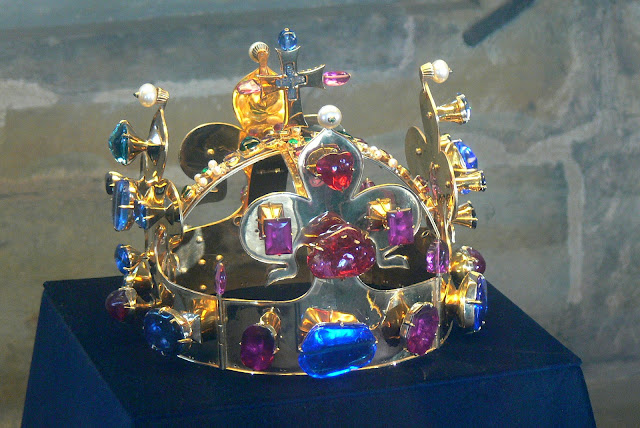 |
| Imperial Crown of the Holy Roman Empire |
So instead, I'll play a game of picking my favorite European royal crowns leaning towards coronation crowns (since many European royal houses have more crowns than we can count). Thanks to Matt Baker's thoroughness, you can watch his video here for the history and details of my 6 favs (plus a few more on his list of 10 famous crowns). As it turns out he did the work for me on this topic!
So here are My 6 Favorite Royal Crowns - I've included not 1, but 2 from the United Kingdom because Queen Elizabeth II uses two. Both have crowned English and British monarchs, and I don't want to break them up. Drum roll, please🥁... here we go:
1) The Crown of Rudolf II, later the Imperial Crown of Austria - Made in 1602 to crown Holy Roman Emperor Rudolf II, it became the official crown of the newly constituted Austrian Empire in 1804 and today is preserved in the Austrian Imperial Treasury. The crown is pure gold, partially enameled, and scattered with diamonds, sapphires, rubies, emeralds, and pearls. Wow, the Ceylon blue sapphire at the top is stunning!

2) Imperial Crown of the Holy Roman Empire - Here is a side view in addition to the front view at the top👆 of the blog. Thought to be made in 962 AD in Western Germany for the coronation of Holy Roman Emperor Otto I, the crown has 8 hinged 22-carat gold plates of images joined together forming an octagon shape. It has 144 unfaceted stones including sapphires, emeralds, and amethysts, plus pearls. To think that it sat on the head of Charles V on February 24, 1530, along with prior Holy Roman Emperors and we still have it! Nowadays it is kept in the Imperial Treasury in Vienna, Austria.
 |
| The Imperial State Crown |
3) (a) The Imperial State Crown [of the United Kingdom] - Shown is both the front and back view of the crown, it was selected by Queen Victoria and Edward VII for each of their coronations. Queen Elizabeth II uses the Imperial State Crown to open Parliament. It has 2,901 precious stones, including the familiar Cullinan II diamond, St. Edward's Sapphire, the Stuart Sapphire, and the Black Prince's Ruby (which is really a red spinel).💂 

St Edward's Crown
(b) St. Edward's Crown (also part of the UK's crown jewels) - The original crown was made in the 11th century, named after the last Anglo-Saxon English King, Edward the Confessor, and remade for Charles II for his 1661 coronation after the Restoration of the English monarchy in 1660. It's considered the traditional coronation crown of English/British monarchs. George V, George VI, and Elizabeth II used it for their coronations. The heavier of the 2 crowns, it weighs 4.9 pounds and is set with 444 precious and semi-precious gemstones. Oh, a gal who's also a monarch cannot have too many stately crowns, can she?
4) Imperial Crown of Russia - First worn for the coronation of Catherine the Great in 1762 and last worn by Nicholas II in 1896. The crown also sat prominently on a chair when Nicholas opened the Russian Duma in 1906. Thankfully, it survived the Russian Revolution of 1917 and is currently on display at the Kremlin Armory Museum in Moscow, all 2,858 carats (or 4,936 single) diamonds, 75 Indian matte pearls and a 398.72-carat red spinel (once mistaken for a ruby).
5) Crown of Saint Wenceslas - Made in 1347 to use for the coronations of the Kings of Bohemia (modern-day Czechoslavia). Ferdinand V was the last to be crowned wearing it in 1836. The crown is reportedly 22-carat gold. The stones decorating it -- consisting of 19 sapphires, 44 spinels, 30 emeralds, and 1 red elbaite -- are polished and not cut in facets so the crown is old-world vintage, colorful and charming! But a terrible "legend" follows it: "Any usurper who places the crown on his head is doomed to die a violent death within a year." (source: Wikipedia + others) Since I'm a gal just having fun as an admirer, not a usurper, would I be cursed placing it on my head?
I cannot identify all of the above👆 coronation crowns but am happy they survived the centuries of history, and I'd love to visit each and every one of them. If pressured, I could be persuaded to try them on. (No, no I shouldn't ... I couldn't, I shouldn't, please no, no, no ... oh if you insist, alright.👸🏻) How about you? Feel free to name them or reveal your favorites in the comments.
You may also enjoy:









No comments:
Post a Comment